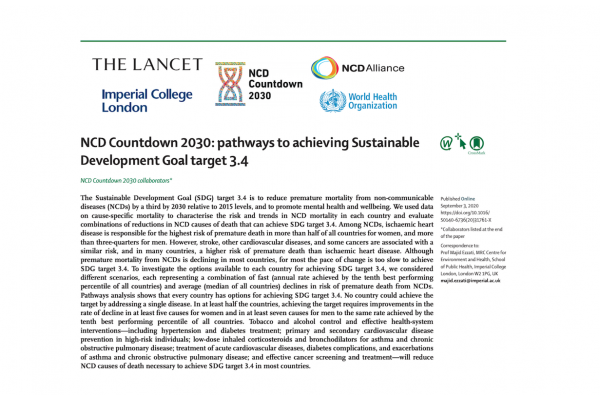The 2nd edition of the NCD Countdown 2030 report, published today in The Lancet, ahead of the Global Week of Action on NCDs next week has revealed that the relationship between COVID-19 and non-communicable diseases highlights urgent need for governments to implement policies to prevent avoidable deaths from chronic diseases.
Around the world, the risk of dying prematurely from preventable and largely treatable chronic diseases such as stroke, heart disease, and stomach cancer has declined steadily over the past decade, but death rates from other chronic diseases such as diabetes, lung cancer, colon cancer, and liver cancer are declining too slowly or worsening in many countries.
Many countries are falling short or behind on their commitments to reducing premature mortality from chronic diseases, or non-communicable diseases (NCDs). Among high-income countries, only Denmark, Luxembourg, New Zealand, Norway, Singapore, and South Korea are on track to meet the SDG target for both men and women if they maintain or surpass their recent rates of progress.
The UN measure of progress towards the SDG target 3.4 is reducing by one-third the risk of death between 30 and 70 years of age from four major groups of NCDs (cancers, cardiovascular diseases (CVDs), chronic respiratory diseases, and diabetes), termed NCD4.
Based on recent (2010-2016) trends, the NCD Countdown 2030 report finds that:
- Among high-income countries, only Denmark, Luxembourg, New Zealand, Norway, Singapore, and South Korea are on track to meet this target for both men and women if they maintain or surpass their 2010–16 average rates of decline.
- 17 countries are already on track to reach the SDG target 3.4 for women: Belarus, Denmark, Iran, Kazakhstan, South Korea, Kuwait, Luxembourg, Latvia, Maldives, Norway, New Zealand, Russian Federation, Singapore, Serbia, Timor-Leste, Ukraine.
- And 15 countries are on track for men: Bahrain, Belarus, Czech Republic, Denmark, Finland, Iran, Iceland, Kazakhstan, South Korea, Luxembourg, Maldives, Norway, New Zealand, Singapore, Slovakia.
- The risk of dying prematurely from NCD4 is declining rapidly in central and eastern Europe.
- However, large countries that showed stagnation or small increases in risk of premature death from these NCDs are Bangladesh (men), Egypt (women), Ghana (men and women), Cote d'Ivoire (men and women), Kenya (men and women), Mexico (men), Sri Lanka (women), Tanzania (men) and the USA (women).
Worldwide, deaths from stroke, heart disease and stomach cancer are falling, although overall progress has slowed compared to the previous decade, according to WHO. Deaths from diabetes, lung cancer, colon cancer and liver cancer are stagnating or rising in many countries. The NCD Countdown 2030 report shows that:
- The risk of premature death from ischaemic and haemorrhagic stroke, heart disease, chronic lung diseases and stomach cancer declined faster than that of other causes. However, heart disease remains the leading cause of premature death in most countries for men and in about half the countries for women.
- In contrast, the risk of premature death from diabetes, colorectal cancer, liver cancer, breast cancer and prostate cancer declined more slowly than other causes, as did lung cancer among women.
- For lung cancer in women and colorectal, liver and prostate cancers in men, the risk of premature death increased in more than half of countries.
"To move forward we must learn from those countries that are doing well and replicate their strategies to NCD prevention and healthcare,” said Professor Majid Ezzati, Professor of Global Environmental Health at Imperial College London, and study lead “Our analysis shows that every country still has options to achieve SDG target 3.4 but they need to address multiple diseases and have strong health systems.”



